
Carrefour Group, S.A., is a French multinational retail and wholesaling corporation headquartered in Massy, France. It operates a chain of hypermarkets, grocery stores and convenience stores, which, as of December 2021, comprised 13,894 stores in over 30 countries, making it the seventh-largest retailer in the world by revenue.

Metro AG is a German multinational company based in Düsseldorf which operates business membership-only cash and carry stores primarily under the Metro brand. As of March 2024, Metro is operating 626 wholesale stores in 21 countries, including Europe, Kazakhstan, and Pakistan.

99 Ranch Market is an American supermarket chain owned by Tawa Supermarket Inc., which is based in Buena Park, California. 99 Ranch has 58 stores in the U.S., primarily in California, with other stores in Nevada, Oregon, Washington, New Jersey, Texas, Maryland, Massachusetts, Arizona, and Virginia. The company also started offering shopping via its website in 2014. In February 2021, the company also launched their mobile app for grocery delivery. One of its main competitors is H-mart.

In non-Asian countries, an Asian supermarket largely describes a category of grocery stores that focuses and stocks items and products imported from countries located in the Far East.

Lotteria is a South Korean company that operates a chain of fast food restaurants in East Asia, having opened its first restaurant in Tokyo in September 1972. Taking its name from its parent company, Lotte Corporation, it currently has franchises in Japan, South Korea, Indonesia, Vietnam, Cambodia, Laos, and Myanmar. The origin of the name is a combination of corporate names Lotte and Cafeteria.
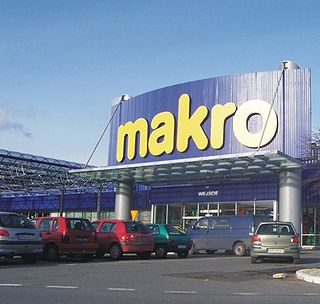
Makro is a Dutch international brand of warehouse clubs, also called cash and carry stores. Makro was founded by SHV Holdings, a Dutch conglomerate based in Utrecht in partnership with German company Metro AG, with the first warehouse club opened in Amsterdam in 1968. Currently, ownership of the worldwide chain of stores is split between different companies like Metro AG in Europe, SHV Holdings in Latin America and CP All in Asia. In many countries, access to stores is restricted to business customers, and the stores are not open to the general public.
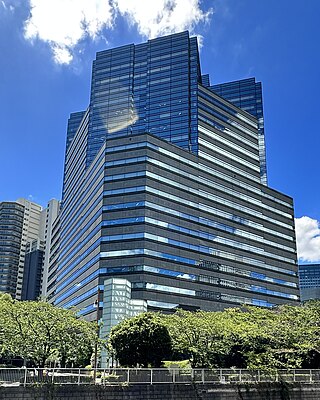
Lawson, Inc. is a convenience store franchise chain in Japan. The store originated in the United States in Cuyahoga Falls, Ohio, but exists today as a Japanese company based in Shinagawa, Tokyo. The company has its headquarters in East Tower of Gate City Ohsaki in Ōsaki, Shinagawa, Tokyo.

The FamilyMart Company, Ltd. is a Japanese convenience store franchise chain, and a subsidiary of Itochu, a Japanese trading company. It is Japan's second largest convenience store chain, behind Seven-Eleven Japan. There are now 24,574 stores worldwide in Japan, Taiwan, China, Philippines, Thailand, Vietnam, Indonesia, and Malaysia. Its headquarters is on the 17th floor of the Sunshine 60 building in Ikebukuro, Toshima, Tokyo. There were some stores in Japan with the name Circle K Sunkus under the operation of FamilyMart. FamilyMart currently has franchise stores in Malaysia, Philippines, Thailand, Indonesia, Taiwan, China, and Vietnam.
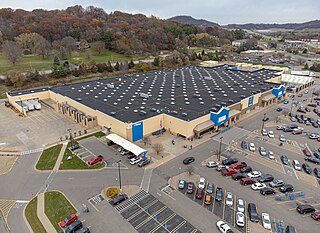
A big-box store, a hyperstore, a supercenter, a superstore, or a megastore is a physically large retail establishment, usually part of a chain of stores. The term sometimes also refers, by extension, to the company that operates the store. The term "big-box" references the typical appearance of buildings occupied by such stores.

Emart Inc. is the largest retailer in South Korea. The retailer was founded on 12 November 1993, by Shinsegae, as the first discount retailer in South Korea. There were 160 stores across the Country as of December 2016.
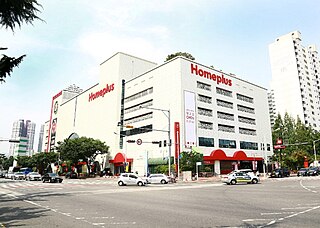
Homeplus (Korean: 홈플러스) is a Korean discount store retail chain running about 140 branches with 25,000 employees throughout South Korea. Homeplus is the second largest retailer in South Korea, behind Shinsegae Group's e-mart chain.
Metro is an Indonesia based chain department store selling cosmetics, apparel and fashion accessories. Founded by Ong Tjoe Kim in 1953, Metro currently has 12 outlets located across Indonesia and 2 in Singapore.
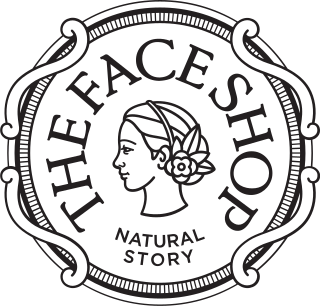
The Face Shop (Korean: 더페이스샵) is a South Korea–based skincare and cosmetics manufacturer, retailer and a franchise business. It is a subsidiary of LG Household & Health Care of LG Corporation. Its products include body, bath, skin care and make-up aimed at both women and men. Its headquarters is in the LG Gwanghwamun Building in Jongno-gu, Seoul.
Lotte Corporation is a South Korean multinational conglomerate corporation, and the fifth-largest chaebol in South Korea. Lotte was founded on June 28, 1948, by Korean businessman Shin Kyuk-ho in Tokyo. Shin expanded Lotte to his ancestral country, South Korea, with the establishment of Lotte Confectionery in Seoul on April 3, 1967.
Shinsegae Inc. is a South Korean department store franchise, along with several other businesses, headquartered in Seoul, South Korea. The firm is an affiliate of Shinsegae Group, South Korea's leading retail chaebol, and one of the big three department store firms in Korea, along with Lotte and Hyundai Department Store. Its flagship store in Centum City, Busan, was the world's largest department store at 3,163,000 square feet (293,900 m2), surpassing Macy's flagship Herald Square in New York City in 2009.
Lotte Shopping Co., Ltd., a distribution unit of Lotte Group, is a multinational retailer headquartered in Seoul, South Korea. Founded in 1979, Lotte Shopping operates various retail stores, including department stores, outlet stores, hypermarkets, drug store chains, and e-commerce. It is also engaged in the film industry by holding the majority of its stake in Lotte Cultureworks.
Retailing in South Korea consists of hypermarkets, department stores, flea markets, traditional markets, and underground shopping malls. Hypermarkets sell dry goods and groceries, similar to Western supercentres. Traditional markets are also popular throughout South Korea.












